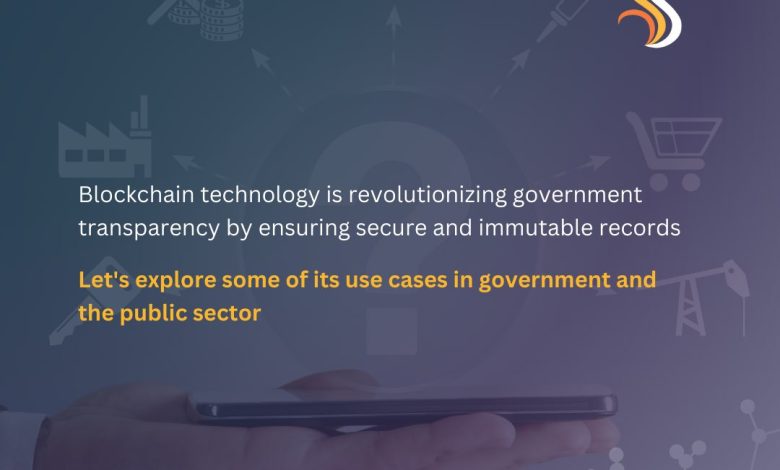The Impact of Blockchain on Government and Public Services

- Understanding Blockchain Technology
- Benefits of Implementing Blockchain in Government
- Challenges and Risks of Using Blockchain in Public Services
- Case Studies of Successful Blockchain Integration in Government
- Future Trends in Blockchain Adoption by Government Agencies
- Ensuring Data Security and Privacy in Blockchain-based Public Services
Understanding Blockchain Technology
Blockchain technology is a revolutionary innovation that has the potential to transform the way governments and public services operate. **Understanding** how blockchain works is essential to grasp its impact on various sectors.
**Blockchain** is a decentralized, distributed ledger technology that securely records transactions across a network of computers. Each transaction is stored in a block, which is linked to the previous block, forming a chain. This creates a transparent and tamper-proof record of all transactions, making it ideal for applications where trust and security are paramount.
One of the key benefits of blockchain technology is its ability to eliminate the need for intermediaries in transactions. This can streamline processes, reduce costs, and increase efficiency in government operations. By **leveraging** blockchain, governments can improve transparency, accountability, and trust in public services.
Moreover, blockchain technology can enhance data security and privacy. The use of cryptographic algorithms ensures that data stored on the blockchain is secure and cannot be altered without consensus from the network. This can help prevent fraud, corruption, and data breaches in government systems.
In addition, blockchain technology enables the creation of smart contracts, which are self-executing contracts with the terms of the agreement directly written into code. This can automate processes, reduce the risk of errors, and increase the speed of transactions in government services.
Overall, **understanding** blockchain technology is crucial for governments and public services to harness its full potential. By embracing blockchain, governments can improve efficiency, transparency, and security in their operations, ultimately benefiting citizens and society as a whole.
Benefits of Implementing Blockchain in Government
Implementing blockchain technology in government can bring about a myriad of benefits that can revolutionize the way public services are delivered. Some of the key advantages of incorporating blockchain in government operations include:
- Transparency and accountability: Blockchain’s decentralized nature ensures that all transactions and data are securely recorded and cannot be altered. This transparency helps to build trust among citizens and ensures accountability in government processes.
- Enhanced security: The cryptographic algorithms used in blockchain technology make it extremely secure and resistant to hacking or tampering. This can help protect sensitive government data and prevent fraud.
- Efficiency and cost savings: By streamlining processes and reducing the need for intermediaries, blockchain can help governments save time and money. Smart contracts can automate tasks, reducing the administrative burden on government agencies.
- Improved service delivery: Blockchain can enable faster and more efficient delivery of public services by providing a secure and transparent platform for transactions. This can lead to better outcomes for citizens and increased satisfaction with government services.
- Reduced bureaucracy: The decentralized nature of blockchain can help eliminate unnecessary bureaucracy and red tape in government operations. This can lead to faster decision-making and more agile responses to citizen needs.
Overall, the implementation of blockchain technology in government has the potential to transform the way public services are delivered, making them more transparent, secure, efficient, and citizen-centric. By harnessing the power of blockchain, governments can create a more responsive and accountable system that meets the needs of their citizens in a rapidly changing digital world.
Challenges and Risks of Using Blockchain in Public Services
Implementing blockchain technology in public services comes with its own set of challenges and risks that need to be carefully considered. While blockchain offers many benefits, such as increased transparency and security, there are also potential drawbacks that need to be addressed.
- One of the main challenges of using blockchain in public services is the issue of scalability. As the volume of transactions increases, so does the strain on the network, potentially leading to slower processing times and higher costs.
- Another risk is the potential for security breaches. While blockchain is known for its security features, no system is completely immune to attacks. Public services need to ensure that their blockchain networks are properly secured to prevent unauthorized access.
- Interoperability is also a concern when it comes to implementing blockchain in public services. Different agencies may use different blockchain platforms, making it difficult to share information seamlessly. Standardization efforts are needed to address this issue.
- Regulatory challenges are another obstacle to the widespread adoption of blockchain in public services. Governments need to create clear guidelines and regulations to govern the use of blockchain technology to ensure compliance and protect users.
Despite these challenges and risks, the potential benefits of using blockchain in public services are significant. By addressing these issues proactively and implementing robust security measures, governments can harness the power of blockchain to improve efficiency, transparency, and accountability in public service delivery.
Case Studies of Successful Blockchain Integration in Government
Several case studies have demonstrated the successful integration of blockchain technology in government operations, showcasing the potential benefits it can bring to public services. One such example is the implementation of blockchain in land registry systems, which has helped streamline the process of property transactions and reduce the risk of fraud. By leveraging blockchain’s secure and transparent nature, governments can ensure the integrity of land records and provide citizens with greater confidence in the system.
Another notable case is the use of blockchain in voting systems, where it has been employed to enhance the security and transparency of elections. By recording votes on a decentralized ledger, governments can prevent tampering and ensure the accuracy of results. This not only increases trust in the electoral process but also reduces the costs associated with traditional voting methods.
Furthermore, blockchain has been utilized in supply chain management to track the provenance of goods and improve transparency. By recording every step of a product’s journey on a blockchain, governments can verify its authenticity and ensure compliance with regulations. This can help combat issues such as counterfeit products and unethical practices, ultimately benefiting both consumers and businesses.
Future Trends in Blockchain Adoption by Government Agencies
Government agencies are increasingly looking towards blockchain technology to improve efficiency, transparency, and security in their operations. Several future trends in blockchain adoption by government agencies are emerging:
- **Interoperability**: Government agencies are exploring ways to make different blockchain systems compatible with each other to streamline processes and data sharing.
- **Smart Contracts**: The use of smart contracts is gaining traction as they automate and enforce agreements between parties, reducing the need for intermediaries.
- **Identity Management**: Blockchain technology can enhance identity management systems, providing secure and tamper-proof verification of citizens’ identities.
- **Supply Chain Management**: Governments are leveraging blockchain to track and trace goods in supply chains, ensuring transparency and authenticity.
- **Voting Systems**: Blockchain can be used to create secure and transparent voting systems, reducing the risk of fraud and manipulation.
Overall, the adoption of blockchain by government agencies is expected to increase in the coming years as more use cases are identified and implemented. This technology has the potential to revolutionize the way governments deliver services and interact with citizens, leading to a more efficient and trustworthy public sector.
Ensuring Data Security and Privacy in Blockchain-based Public Services
Ensuring data security and privacy in blockchain-based public services is crucial to maintaining trust and credibility in government operations. Blockchain technology offers a decentralized and transparent way of storing data, but it also presents unique challenges in terms of security and privacy.
One way to address these challenges is through the use of encryption techniques to secure data stored on the blockchain. By encrypting data before it is added to the blockchain, sensitive information can be protected from unauthorized access. Additionally, the use of private and public keys can help ensure that only authorized parties have access to specific data.
Another important aspect of ensuring data security and privacy in blockchain-based public services is the implementation of robust access control mechanisms. By defining clear roles and permissions for different users within the blockchain network, government agencies can prevent unauthorized access to sensitive information.
Furthermore, regular audits and monitoring of the blockchain network can help detect any suspicious activity and prevent potential security breaches. By continuously monitoring the network for any anomalies, government agencies can take proactive measures to protect data security and privacy.
In conclusion, while blockchain technology offers many benefits for government and public services, it is essential to prioritize data security and privacy. By implementing encryption techniques, access control mechanisms, and regular monitoring, government agencies can ensure that sensitive information remains secure and protected in blockchain-based public services.



